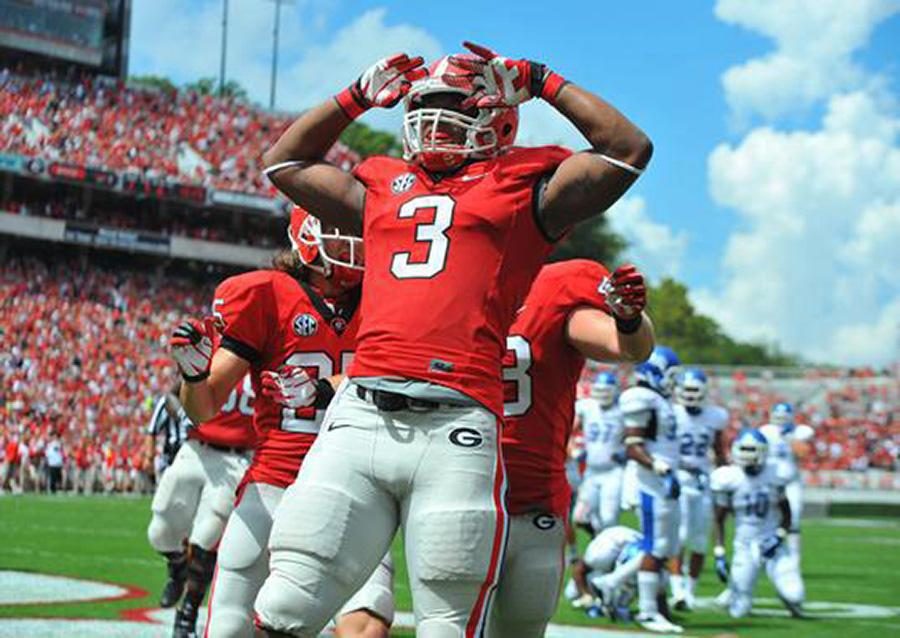NCAA should focus on larger infractions in athletic policy
Georgia Bulldogs running back Todd Gurley is the latest involved in an NCAA scandal for getting paid to sign autographs.
October 20, 2014
If it is starting to feel like it has been a long time without an NCAA scandal, don’t worry. On Oct. 9, the NCAA suspended University of Georgia running back Todd Gurley, who was the odds-on favorite to win the Heisman trophy, for getting paid to sign autographs. It was recently revealed that he had sold his signature to a Georgia memorabilia store for $400.
According to Forbes, UGA made $52.3 million in excess revenue from the football program in 2013. According to ESPN, Gurley’s jersey was selling for $134.95 before his suspension. That is $134.95 more than Gurley will see for that jersey.
While Gurley serves his suspension, Florida State University quarterback Jameis Winston has given the country his best Houdini, escaping NCAA suspension twice — once for a sexual assault allegation and once for theft. He is playing again after being suspended only a single game for yelling an obscene phrase in the campus cafeteria. Yet it is only now, after he has become linked to the current Gurley scandal, that people are starting to fear for his eligibility. Additionally, FSU quarterback Treon Harris was just reinstated after having a sexual battery case against him dropped.
While the aforementioned scandals involving sexual assault, theft and misogynistic obscenities resulted in a total of two missed games, Gurley will likely miss the remainder of the season, and possibly have the rest of his career tarnished if NFL teams do not want to deal with his “off-the-field issues.”
Sophomore goalkeeper of the men’s soccer team Lucas Doucette criticized the NCAA’s policies for being unjust.
“According to NCAA rules, he was rightfully suspended,” Doucette said. “Obviously that’s not the main issue. The main issue is that the NCAA is a multi-million dollar business that is making money off of college athletes who are not getting paid … it is hypocritical and corrupt.”
Yet Doucette made it clear that he did not feel giving athletes like himself a salary would fix the issue.
“They are student athletes who are supposed to be getting a good education,” Doucette said. “But it’s wrong that their coaches are making ridiculous amounts of money off their players. The system needs to be changed.”
Why is the NCAA in a position to say that making some money off of personal stardom is worse than crimes that could warrant jail time? If the NCAA is really trying to protect its image, it needs to stop worrying about the harmless money that superstar players are making on their jerseys or the subtle violations of recruiting that certain coaches have made. The NCAA has become too strict in all the wrong places. It needs to start worrying more about the education of its players against sexual, physical and mental abuse. It needs to promote a culture that is less violent, material and misogynistic, and rid itself of the current culture that undermines the gravity of committing serious crimes. If not, it will not be long before we see football fade in the United States. No one feels better about the direction football culture is going just because Gurley got suspended. No sport, no university and no entity is too big for greater social change, no matter how big or expensive the stadium it tries to hide behind is.
A verion of this story appeared in the Monday, Oct. 20 print edition. Email Bobby Wagner at [email protected].



























































































































































